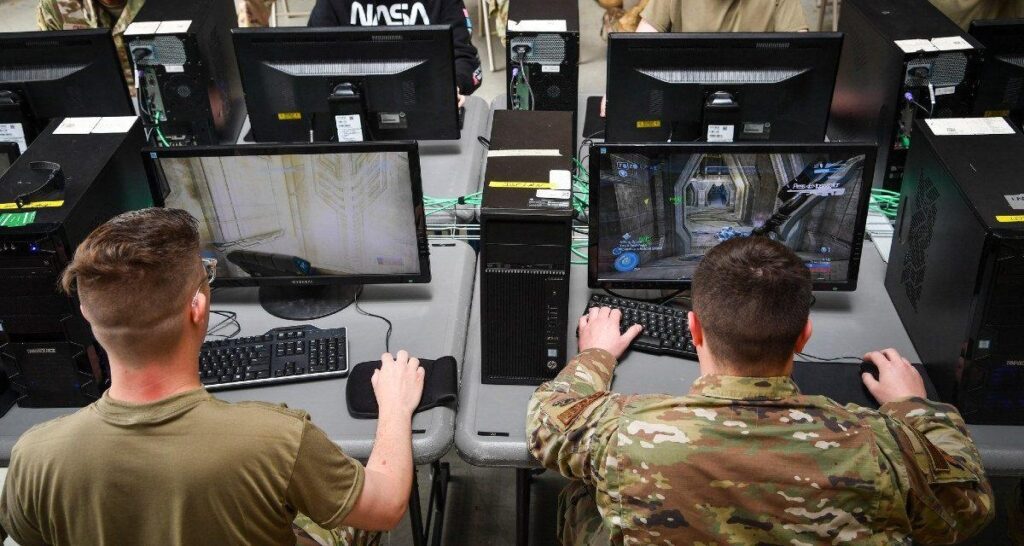Military simulations in training exercises have become an essential part of modern warfare. These simulations, also known as “war games,” aim to enhance the skills and decision-making abilities of military personnel in a controlled environment. However, as technology progresses, the line between simulations and reality can sometimes become blurred, leading to ethical considerations. This content discusses the background of military simulations, their benefits, and the ethical dilemmas they pose. It also proposes ways to mitigate these concerns, such as providing support systems for soldiers and implementing privacy protocols. Overall, military simulations play a crucial role in training, but ethical considerations must be taken into account to ensure the well-being of the soldiers involved.
Introduction
Military simulations in training exercises have become an integral part of modern warfare. These simulations, often referred to as “war games,” aim to provide military personnel with realistic scenarios to enhance their skills and decision-making abilities in a controlled environment. However, as technology continues to advance, the line between simulations and reality can sometimes become blurry, raising important ethical considerations.
Background
Military simulations have been used for training purposes for centuries, starting with tabletop exercises and evolving into advanced computer-based simulations. These simulations replicate real-life combat situations, allowing soldiers to practice various aspects of warfare, including strategy, tactics, and communication. With the rise of virtual and augmented reality technologies, simulations have become even more immersive, providing an almost lifelike training experience.
The Benefits of Military Simulations
Military simulations offer several advantages over traditional training methods. Firstly, they provide a safe environment for soldiers to learn and make mistakes without real-world consequences. This enables them to hone their skills and learn from their errors, ultimately improving their performance on the battlefield.
Moreover, simulations allow military personnel to train in a variety of scenarios that may be difficult or impossible to recreate in real life. For example, they can simulate combat in different terrains, weather conditions, or even urban environments. This versatility offers valuable experience for soldiers, preparing them for a wide range of potential situations.
In addition, simulations can be cost-effective compared to conducting large-scale field exercises. It reduces the need for expensive equipment, ammunition, and resources while still providing valuable training opportunities. Simulations also allow for rapid scenario iteration, providing soldiers with the ability to repeat and refine their decision-making and tactical skills quickly.
The Ethical Dilemmas
While military simulations offer numerous advantages, they also raise important ethical considerations. One of the key concerns is the psychological impact on soldiers. Immersive simulations can blur the line between reality and the virtual world, potentially causing stress, anxiety, and post-traumatic stress disorder (PTSD) in participants. Some simulations may expose soldiers to violent and traumatic situations, raising questions about the potential long-term effects on their mental well-being.
Another ethical dilemma arises when simulations involve civilian populations. Simulations that require soldiers to make decisions on engaging with civilians or handling sensitive situations may blur the lines between acceptable conduct and potential violations of human rights. There is a risk of desensitization to the real-world consequences of actions due to repeated exposure to simulated scenarios, which could affect the ethical decision-making abilities of military personnel.
Furthermore, the realistic nature of modern simulations raises concerns about privacy and the potential for misuse. Advanced technologies such as facial recognition and behavioral analysis can track and record the performance of individual soldiers during training. While this data can be useful for training purposes, there is a risk of misuse or invasion of privacy if such information falls into the wrong hands or is used for purposes other than training.
Mitigating Ethical Concerns
Addressing the ethical dilemmas associated with military simulations requires thoughtful consideration and proactive measures. Adequate debriefing and support systems should be in place to help soldiers cope with any psychological distress resulting from their participation in simulations. This includes access to counseling services and ongoing mental health monitoring.
Developers and trainers also have a responsibility to ensure that simulations avoid excessive violence or unnecessary trauma that may lead to desensitization. It is essential to strike a balance between realism and ethical considerations, prioritizing the overall well-being and ethical development of military personnel.
Regarding privacy concerns, strict protocols should be implemented to safeguard sensitive data collected during simulations. Limiting access to this information and having clear guidelines for its use can help prevent potential misuse or violation of privacy rights.
Conclusion
Military simulations play a crucial role in training exercises, providing soldiers with valuable experience and opportunities for skill development. However, as simulations become more realistic and immersive, ethical concerns must be taken into account. By addressing these concerns through debriefing, support systems, and privacy protocols, we can ensure that military simulations remain effective training tools while upholding ethical principles and the well-being of the soldiers involved.
